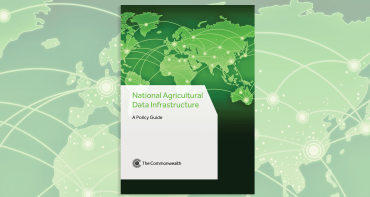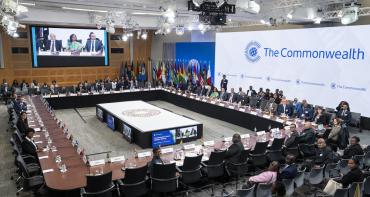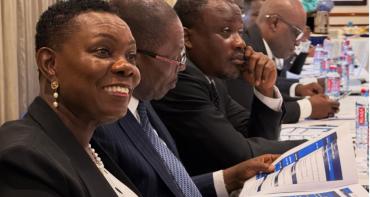The government’s efforts to lodge and defend continental shelf submissions to extend the country’s maritime jurisdiction at the United Nations have and continue to be supported by the Commonwealth Secretariat.

Seychelles hosts the Global Biennial Conference on Small States between 12-13 May, bringing together governments and regional and international development partners to consider the challenges and opportunities facing those developing countries with populations under 1.5 million.
The host country, located in the Indian Ocean some 1,600 km east of continental Africa, has built a global reputation as a pioneer of the ‘blue economy’ concept, where economic growth and development is geared towards the wise long-term management of marine space, resources and the environment.
“We see the blue economy as all those economic activities that directly or indirectly take place in the ocean, use outputs from the ocean, and put goods and services into ocean activities,” says Mr Jean-Paul Adam, Minister of Finance, Trade and the Blue Economy
Mr Adam, who was appointed to his brief by President James Michel in February 2015, clearly believes that many small states, and larger states too, can learn from Seychelles’ experience. “As a country we have consistently maintained that healthy oceans and seas are essential to a sustainable future for all, and not only for small island developing states,” he says.
In March 2015, President Michel established a Blue Economy Research Institute (BERI) in association with the University of Seychelles. Soon afterwards, the government embarked on plans for a Roadmap for the Blue Economy, with support from the Commonwealth Secretariat, which aims to aid the development of domestic blue economy industries.
Tourism and fisheries at present account for 11% of the country’s workforce and 33% of GDP, but Mr Adam argues more can be done to boost marine-based industries, including, he says, providing greater support to local fisheries entrepreneurs and small and medium-sized enterprises. “The roadmap is expected to help us identify the optimal short and medium term strategies for mainstreaming blue economy initiatives nationally,” he says.
“There are a number of ways in which Seychellois entrepreneurs are already seizing these opportunities by for example differentiating their product on the basis of sustainable practices, or by using resources which were traditionally waste - such as seaweed.”
“As well as having a long-established and robust legal framework for environmental protection and conservation, we have embarked on a project to develop a comprehensive marine spatial plan, whereby we define the economic and conservation activities to be developed throughout our maritime zones, which includes a vast exclusive economic zone (EEZ) and areas of continental shelf beyond the EEZ,” he adds.
The government’s efforts to lodge and defend continental shelf submissions to extend the country’s maritime jurisdiction at the United Nations have and continue to be supported by the Commonwealth Secretariat.
The overall objective of this work is to position the government to better manage its marine space and resources, including possibly lucrative mineral and petroleum resources.
However, Mr Adam explains that the management of marine resources should not be at the expense of the marine environment
“As a large oceanic nation we take very seriously our role as one of the planet’s blue guardians,” he says, adding that the government intends to establish protected areas over some 30% of its EEZ.
He continues: “We are developing enhanced fisheries management tools to implement appropriate stock management and we are in discussion with international financial institutions to raise a ‘Blue Bond’ to help provide affordable financing for such initiatives. The latter is aimed at reinforcing marine related activities for sustainable purposes while simultaneously providing affordable financing for the fisheries sector.”
In these efforts, Mr Adam says he is especially appreciative of the assistance offered by Commonwealth experts, which has ranged from the drafting of regulations to placing long-term advisers in government departments to work with government officials.
“The Commonwealth Secretariat has been a long-standing partner in our efforts to diversify our economy, build capacity at different levels of government and promoting sustainable development,” the Minister continues.
“For us the Commonwealth remains a staunch and trusted partner in capacity and resilience building.”
Learn more about the Commonwealth Secretariat’s support to Seychelles
Media Contact:
Will Henley
Senior Communications Officer
Commonwealth Secretariat
Email: [email protected]
Photo caption: Seychelles Minister of Finance and the Blue Economy Jean-Paul Adam (centre) meets with fishermen in Bel Ombre, Seychelles



